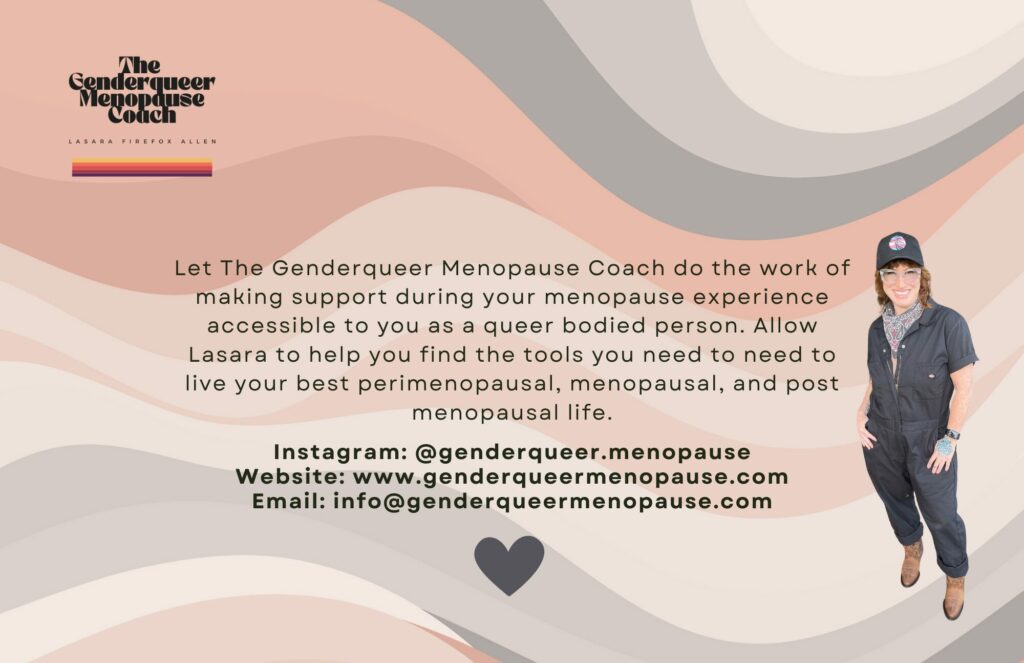by Lasara Firefox Allen, MSW
Menopausal sexual health and wellbeing may be a significant area of focus for genderqueer folx. Menopause is a significant life stage that brings about physical and emotional changes for many people. For genderqueer folx who identify outside the binary, navigating menopause can present unique challenges, not the least in the realm of sexual health. In this article, we explore the intersection of genderqueer identity and menopause, shedding light on some experiences and considerations that may arise during this the menopause transition.
Navigating Genderqueer Menopause

The genderqueer designation encompasses a diverse spectrum of identities, including nonbinary, genderfluid, and gender-nonconforming (gnc), agender, and others. Many who identify with this designation, label, or identifier consider themselves to exist under the transgender (trans) umbrella. Genderqueer folx may, or may not, experience gender dysphoria related to their sexual anatomy.
Menopause, marked by the cessation of menstrual cycles and changes in hormone levels, can evoke a range of emotions and experiences within our community. The physical changes associated with menopause, such as hot flashes and dryness of the vulva/bonus hole/front hole, may intersect with an individual’s gender identity, highlighting the need for tailored support and understanding. Depending on whether or not, or in what ways, a genderqueer person experiences dysphoria, their experience of menopause, and the sexual impacts thereof, may be more complex, more uncomfortable, or more gender affirming–depending on a person’s relationship with their sexual anatomy and gender identity.
Challenges in Menopausal Sexual Health
For many of us, sexual health is an integral aspect of overall well-being, yet genderqueer individuals navigating menopause may encounter unique challenges in this area. Traditional discussions and resources surrounding menopause often overlook the experiences of genderqueer individuals, often leading to feelings of invisibility and alienation. Finding affirming support is essential to an genderqueer folx buildling an empowered experience of the menopause transition.

The impact of hormonal changes on sexual desire and arousal can vary widely among genderqueer individuals, as it will with anyone.
One may experience an increase in libido. Especially in perimenopause, some experience a heightened sex drive. Note: folx who have a uterus are fertile during this time. And, in menopause and postmenopause, egg-having folx who share sexual intimacy with sperm-having folx may feel relieved at the end of pregnancy risk. That said, the experience of the cessation of biological reproductive capacity can be complex: while some may feel relief, others may feel grief. And, some folx feel both!
One may also experience a drop in libido, sexual desire, or complication with sexual response. Especially in the menopause year, or once in the postmenopausal phase, one may experience a rapid, or gradual, drop in libido, desire, or impulse. Some causes for this drop may be hormonal changes, vaginal/front hole/bonus hole atrophy–which may result in pain. Atrophy is a common symptom of menopause, and is caused by the lack of estrogen in tissues.
In many cases, atrophy can be easily reversed with appropriate medication. MHT (menopausal hormone therapy) may be helpful for many who are experiencing atrophy. In other cases, pelvic floor PT may be helpful. Talk to your healthcare provider for an appropriate referral, or about the possibility of treatment.
Things to Do to Increase Your Menopausal Sexual Health
Decide how important a sexual life is to you. For some, menopause brings a shift away from prioritizing sexuality. For others, the drop in libido can be shocking, painful, disorienting, and may have ego and identity implications. There is no single “right way” to react to changes in your libido, desire, sexual response, and functioning. Find out what is true for you.
What will work for YOU? How do you want your menopause experience to play out? One tool that may help you define this, is to write your Menopause Manifesto! (This is a hugely empowering exercise that my clients love!) Educate yourself about what’s happening in and to your body. Reflect. Play
Make time for intentional sexual exploration. learning, reflection, sexual play: Partner play and Solo play
Nurture your sexual spark in ways that feel good to you. For example, when I found my libido had dropped through the floor, then realized I wanted it back, I read tons of books on sexual health and wellness, consumed other media on sexual health and wellness. shared these experiences with my partners, journaled, talked it out in therapy, and talked it out with my spouse and other partners. All of these tings were helpful to me. What would feel good and be helpful to you?

Know the Health of Your Sexual Parts. If your sexual anatomy is not feeling good, getting to the actual sex may be more of a hurdle. To check in on your menopausal sexual health, tune in. Use your senses: sensation/feel (are you experiencing pain? Dryness?), sight (do you see changes in your sexual anatomy like thinning of skin?), smell (has your scent shifted in any way that is unpleasant?), taste (if you taste your secretions, this will also offer information). If something seems off, see your qualified medical professional.
You may want to explore the possibility of hormonal treatment as part of treatment of a drop in desire, and you may choose to seek out pelvic floor PT if you are experiencing sexual pain or urinary issues.
Practice self-care. Practicing self-care may help with desire. Working out, stress reduction techniques, getting massages, and other forms of self-care may help you feel more in the mood.
Live Healthfully. Stay active. Limit use of, or quit, tobacco and alcohol. The negative physiological impacts of alcohol and tabacco intensify during the menopause transition.
Sleep well. Good sleep is essential to both short-term emotional and mental health, and long-term physical health and longevity. Insomnia is a common effect of the menopause experience, and you may need to improve sleep hygiene if you are losing sleep.
If your sexuality and sexual expression are important to you, find ways to prioritize your menopausal sexual health and wellness. And, if you are having dramatic or bothersome shifts or symptoms, talk to a healthcare provider about your concerns.
Navigating Support and Resources
(SIDE NOTE TO HEALTHCARE PROVIDERS: To promote sexual health and well-being among genderqueer individuals during menopause, it is essential to foster inclusive and supportive healthcare environments. Healthcare providers should receive training on gender diversity and cultural competency to better understand and address the unique needs of genderqueer patients.)
Open communication between you and and your healthcare providers is crucial for effective support. This may involve discussing concerns and preferences regarding hormone replacement therapy, alternative treatments, or strategies for coping with physical and emotional changes.
Community support and resources also play a vital role in navigating genderqueer menopause. Online forums, support groups, coaching, and LGBTQIA+ affirming healthcare providers can offer validation, support, and practical advice to individuals seeking guidance during this phase of life.
Genderqueer menopause presents a multifaceted intersection of biological, social, and psychological factors, particularly concerning sexual health and wellbeing. Getting affirming support during this time of transition can make all the difference.


